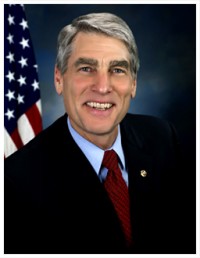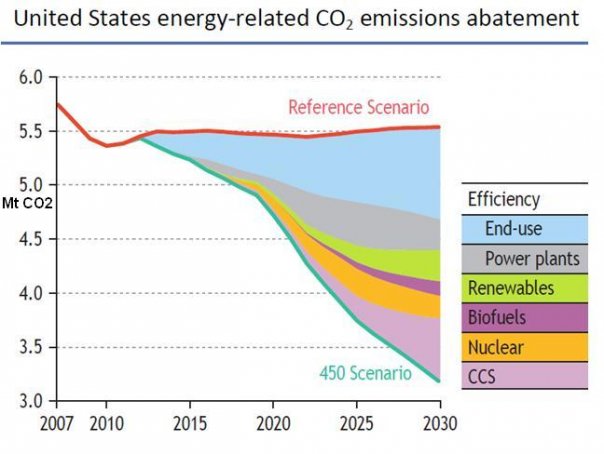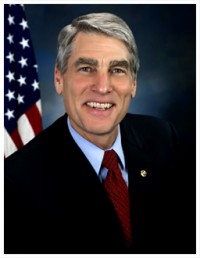 Sen. Mark Udall (D-Colo.)Mark Udall — son of legendary enviro-friendly Arizona Rep. Morris “Mo” Udall — had been a member of Colorado’s House delegation for 10 years when he won the race to replace retiring senator Wayne Allard. Just 17 days into his first term, Colorado’s other senator, Ken Salazar, left to head up Obama’s Interior Department, leaving Udall the state’s senior senator. (Over in New Mexico, his cousin Tom Udall also jumped to the Senate after 10 years in the House.)
Sen. Mark Udall (D-Colo.)Mark Udall — son of legendary enviro-friendly Arizona Rep. Morris “Mo” Udall — had been a member of Colorado’s House delegation for 10 years when he won the race to replace retiring senator Wayne Allard. Just 17 days into his first term, Colorado’s other senator, Ken Salazar, left to head up Obama’s Interior Department, leaving Udall the state’s senior senator. (Over in New Mexico, his cousin Tom Udall also jumped to the Senate after 10 years in the House.)
Udall is a vigorous outdoorsman, an accomplished mountaineer, and a long-time supporter and director of Colorado’s Outward Bound program, so it’s no surprise that he forged a reputation as a friend of the environment in the House, where he was co-chair of the Renewable Energy and Energy Efficiency Caucus. In the Senate he serves on the Energy Committee and is expected to play a key role in climate/energy policy. Though he’s known in Colorado for his support for the state’s renewable energy standard, on the national stage he has taken some heat from enviros for his support for nuclear power.
I caught up with him by phone last week as he headed to a Clean Energy Summit he co-hosted with Third Way, The Keystone Center, and The University of Colorado.
——
Q. Have you met with Sens. John Kerry, Lindsay Graham, and Joe Lieberman about their climate/energy bill? Any idea what to expect out of that process?
A. I’ve had individual conversations with all three of those senators. They are being discreet, and given the recent example of health-care reform efforts — with lots of leaks and proposals, reactions and criticisms — I think they are doing the right thing. It’s been long known that a climate and energy bill in the Senate would have to be a bipartisan effort. The interests of various regions, philosophies of individual senators, make it very clear. In the end what they are trying to craft is an “all of the above” strategy that includes every energy source.
Q. Sen. Evan Bayh, among others, has talked about stripping cap-and-trade out and passing an energy-only bill. Would you support that?
A. I have not reached that point. I think it’s crucial to price carbon.
There are different ideas as to how to price carbon. Cap-and-trade has of course been vetted and discussed widely. Another proposal is cap-and-dividend, which to some people is a simpler approach. Others, like Sen. [Bob] Corker and Sen. [Lisa] Murkowski, have expressed interest in a carbon tax.
But I continue to believe strongly that if we want to compete with the Chinese and the Indians and Europe when it comes to clean energy, unless you price carbon, you don’t send the right signals to the marketplace. I hear that from the utilities — Jim Rogers at Duke Energy and John Rowe from Exelon — and from industry leaders like Dow Chemical, GE, and others. It’s a mainstream idea.
It’s tempting to believe that a robust energy-only bill like we’ve passed out of the Energy Committee would reduce our carbon emissions, but based on all the scientific analysis I’ve seen, it wouldn’t. It would drive some innovation; it would send resources into research and development; it would improve our capacity to expand our transmission system. But it wouldn’t drive down carbon emissions, and for that reason I’m not willing at this point to give up on a price on carbon.
Q. Colorado Gov. Bill Ritter supports, and the Colorado House just passed, a state renewable energy standard (RES) of 30 percent by 2020 — as high as any state in the nation, and almost double what’s in the Energy Committee bill. Will you push to raise the national RES?
A. Yes, I will. I’ve long been a proponent of a robust national RES.
Way back in 1997 I proposed an RES for Colorado. It was not successful initially, but we worked on it, advocated for it, and finally after a series of close calls in the legislature it went to the voters directly. In ’04 we passed what some called an aggressive, unrealistic RES: 10 percent by 2015. Well, we met that goal in just a few years. The legislature then increased it to 20 percent by 2025. We’re on track to reach that goal, and now the legislature’s responding again.
The reason Colorado has been aggressive, and the reason there’s widespread support, is we see the results of an RES. We’ve created thousands of jobs. We attracted two solar companies, Abound Solar and Ascent Solar, who are hiring hundreds of workers to produces PVs. We had Vestas here with four manufacturing plants; they’ll employ 2,500 people. We have a new wind farm and 150 jobs on the Eastern plains, a rural part of Colorado — it’s always hard to find a job there. Our state’s been shielded from this terrible economy because of the mix of clean energy, traditional energy, tourism, tech, and agriculture. Having a clean energy element is a part of being diversified. Our policymakers and leaders see that as the state’s future.
My job is to share [Colorado’s] story in the Senate and develop more and more advocates in support of a national RES, even in areas that are skeptical right now, like the South. They don’t think they have much wind or solar. They have abundant biomass, which fits under the RES. And they actually have more sun and in some cases more wind than they realize. But this has been a painstaking process, to make that case and encourage those senators to see the potential for their own states.
Q. Your cousin Tom is backing something called the “constitutional option,” whereby senators would vote at the beginning of next session to change the rules of the Senate to either eliminate or scale back the filibuster. Sen. [Tom] Harkin has introduced a resolution that would reform the filibuster. Do you support either of those efforts? And do you think the Senate is working with its current rules?
A. I am reviewing both of those proposals. I am a reformer by nature, and I’m deeply concerned that the Senate isn’t working as effectively as it might, and must.
The filibuster has been abused — over a hundred filibusters in the first half of this Congress. We’ve already beaten the record for a two-year session of the Senate, in one year! At the same time I want to make sure the rights of political minorities and small states are protected; that is the essential idea behind the creation of the Senate in the first place.
Both my cousin’s idea and Sen. Harkin’s draw attention to the fact that if we continue working like we are now — not working, I should say — we’re going to continue to lose the trust of the American people. We’re not going to be able to respond to the challenges that America faces.
Read more interviews with members of Congress:
- Sen. Tom Udall (D-N.M.)
- Rep. Brian Baird (D-Wash.)
- Rep. Tom Perriello (D-Va.)
- Sen. Bernie Sanders (I-Vt.)



